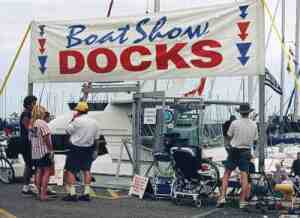Some thoughts on the perils of boat appraising
 One of the most important and sometimes the most difficult aspects of dealing with pleasure boats from everyone’s perspective; buyers, sellers, yacht brokers and marine surveyors, is the establishing of a monetary value for a boat.
One of the most important and sometimes the most difficult aspects of dealing with pleasure boats from everyone’s perspective; buyers, sellers, yacht brokers and marine surveyors, is the establishing of a monetary value for a boat.
In my early days as a full time yacht broker in the 80’s I was quite surprised to learn that almost all banks and other lending institutions relied almost exclusively on the values given by marine surveyors to make financing decisions. When they needed an appraisal on a house or a commercial building they would not think to call a house inspector for a value, they called a Real Estate company, so why would they not turn to a Yacht Broker to value a boat?
I found this particularly puzzling because, especially back in those days, I did not think most marine surveyors were particularly qualified to place values on boats. Most of them were people who had repair shops or were small boat builders and did surveys on the side to supplement their incomes. Often when surveying a boat for a bank or buyer, they found themselves looking at the first example of that particular model they had ever seen. They were not involved on a day to day basis with selling boats and often had no idea what that particular boat or others like it were worth, and sometimes just pulled a figure out of the air. Why a bank would assume that “Joe’s Boat Shop” would have a better idea of the real value of a used boat than a full time Yacht Broker was beyond me.
Upon reflection I have concluded that many years ago when boats were smaller, cheaper and much simpler, the marine market was a much smaller portion of the insurance market than it is today, and perhaps was not regarded by insurance companies as particularly important or risky. Further the yacht broker industry was in its infancy, and indeed was non-existent in many areas. New boat dealer networks were primitive at best.
 Not seeing a strong need for a professional appraisal (that they would have to pay for), and not seeing an obvious source for one, the insurance companies simply asked the person they were already paying to inspect the boat to place a value on it.
Not seeing a strong need for a professional appraisal (that they would have to pay for), and not seeing an obvious source for one, the insurance companies simply asked the person they were already paying to inspect the boat to place a value on it.
Move decades forward to the present and you have insurance companies and financial institutions used to getting what is essentially a free appraisal on marine vessels from marine surveyors. The accuracy of these appraisals has improved somewhat of late with the advent of more full time marine surveyors and professional organizations such as the Society of Accredited Marine Surveyors, which encourages its members to learn how to do proper valuations, but there are still problems.
Consider this hypothetical (and somewhat oversimplified) scenario:
Two identical boats get listed on the same day with two different brokers, both with an asking price of $110,000.00. A week later both are sold with accepted offers of $100.000.00 each. They are both surveyed and each has an unexpected and unusual problem that is going to cost $25,000.00 to fix.
 The first broker negotiates a deal where the owner agrees to fix the boat and the buyer proceeds with the deal.
The first broker negotiates a deal where the owner agrees to fix the boat and the buyer proceeds with the deal.
The second broker negotiates a deal where the sale price is lowered to 75,000.00 and the buyer assumes responsibility for the repair.
Both brokers report their sale to “BUC”, “Soldboats.com”, “Computer Boat Values”, “Boat Pricing For Dummies” and several other leading authorities at the actual selling prices just like they are supposed to.
Three more identical boats come on the market and the first broker gets all three listings because he got $25,000.00 more than the second broker. He gets offers on two of them right away for 100,000.00 each, but loses both deals on the surveys (even though neither boat had any serious problems) because the surveyors reported they had researched recent selling prices (from five different sources) and the average value for that type of boat is only $87,500.00.
The third boat gets taken off the market.
The moral of the story: If it could be done by just reading a book, anyone could do it, and marine surveyors wouldn’t be asked to establish a value.
If I worked for a bank or an insurance company and needed a value on a boat, I would ask an established yacht broker (and pay them) to appraise it with the assumption it was in good condition (obviously I would not use the broker involved in the sale). Any problems that turned up later in the marine survey would be costed and deducted from the broker’s appraised value.
If you are a marine surveyor and are going to place values on boats that will affect sales and financing, be sure to do your homework.






